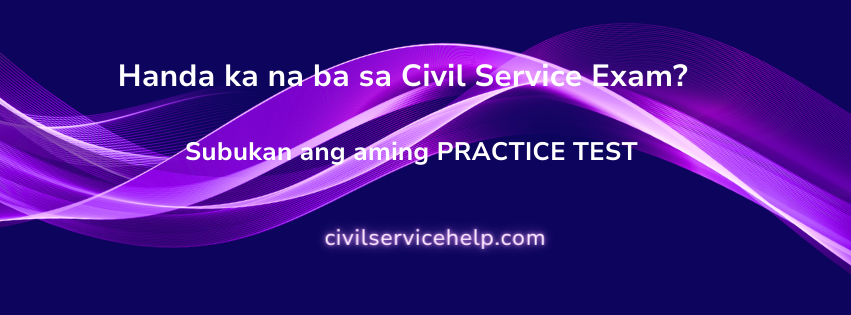Paano ba i-master ang Parallelism?
Subukan ang mga Practice Test para mas handa sa Civil Service Exam

Parallelism - Civil Service Exam
Comprehensive Review Material on Parallelism
Introduction to Parallelism
- Definition: Parallelism involves using the same pattern of words to show that two or more ideas have the same level of importance. This can happen at the level of words, phrases, or clauses.
- Purpose: Ensures coherence and balance in sentences, making them easier to read and understand.
1. The Importance of Parallelism
- Clarity and Flow: Helps maintain a clear and smooth flow in writing by aligning grammatical structures.
- Enhanced Readability: Parallel structures are pleasing to read and can make the text more persuasive.
- Error Prevention: Recognizing and applying parallelism helps avoid common grammatical errors in writing.
2. Identifying Parallelism
- Types of Parallelism:
- Word Parallelism: Involves repeating single words of the same type (nouns with nouns, verbs with verbs, etc.).
- Phrase Parallelism: Involves repeating phrases of similar structures.
- Clause Parallelism: Ensures that clauses are structured in a similar way.
- Common Contexts for Parallelism: Lists, comparisons, and contrasts are typical contexts where parallelism is expected.
3. Common Errors and Solutions
- Error Identification: Teach how to spot differences in grammatical forms which break parallelism.
- Correction Techniques: Provide strategies for restructuring sentences to achieve parallelism.
- Examples: Include examples of non-parallel structures and their corrected forms.
4. Practice with Answers
- Exercises: Include a variety of exercises designed to challenge the learner to identify non-parallel structures and correct them.
- Answers and Explanations: Provide answers with detailed explanations to help learners understand their mistakes and learn the reasoning behind corrections.
5. Tips for Writing with Parallelism
- Consistency is Key: Always check for consistency in tense, structure, and voice.
- Use Conjunctions to Help: Words like ‘and’, ‘or’, ‘but’ often necessitate parallel structures.
- Revise for Parallelism: Always look back over your writing to ensure that parallelism is maintained where it should be.
6. Further Reading and Resources
- Books: List books that focus on advanced grammar and style, including sections on parallelism.
- Websites: Provide links to online exercises and tutorials on parallelism.
- Tools: Recommend grammar checking tools that can help identify parallelism errors.
Conclusion
- Summarize the importance of mastering parallelism in both academic and professional writing.
- Encourage continual practice and revision to improve writing skills.
Practice Test on Parallelism - Civil Service Exam
Question 1 : “Julia enjoys reading books, jogging in the park, and to bake cookies.”
Choices: A. Julia enjoys reading books, jogging in the park, and baking cookies.
B. Julia enjoys to read books, jogging in the park, and baking cookies.
C. Julia enjoys to read books, to jog in the park, and baking cookies.
D. Julia enjoys reading books, to jog in the park, and to bake cookies.
Correct Answer: A. Julia enjoys reading books, jogging in the park, and baking cookies.
Explanation: The original sentence lacks parallel structure because it mixes gerunds (reading, jogging) with an infinitive (to bake). The corrected sentence uses only gerunds, thus maintaining parallel structure: reading books, jogging in the park, and baking cookies. This ensures that each element of the list conforms to a similar grammatical structure, which is crucial for clear and effective writing.
Question 2 : “He wanted to buy a new shirt, looking for a pair of shoes, and to see a movie.”
Choices:
A. He wanted to buy a new shirt, to find a pair of shoes, and to see a movie.
B. He wanted buying a new shirt, finding a pair of shoes, and seeing a movie.
C. He wants to buy a new shirt, to look for a pair of shoes, and seeing a movie.
D. He wants to buy a new shirt, look for a pair of shoes, and to see a movie.
Correct Answer: A. He wanted to buy a new shirt, to find a pair of shoes, and to see a movie.
Question 3 : “The teacher asked the students to read quietly, write neatly, and they should be listening attentively.”
Choices:
A. The teacher asked the students to read quietly, write neatly, and listen attentively.
B. The teacher asked the students reading quietly, writing neatly, and listening attentively.
C. The teacher asked the students that they read quietly, write neatly, and listen attentively.
D. The teacher asked the students to read quietly, they write neatly, and to listen attentively.
Correct Answer: A. The teacher asked the students to read quietly, write neatly, and listen attentively.
Question 4: They focused on training hard and (win) ____ the championship.
Choices:
A. to win
B. winning
C. None
D. None
Answer: A. to win
Solution: “Training” in this context is part of the phrase “focused on training,” which should be paralleled with “to win,” maintaining the infinitive structure.
Question 5: She advised me to save money and (invest) ____ wisely for the future.
Choices:
A. to invest
B. investing
C. None
D. None
Answer: A. to invest
Solution: “To save” is an infinitive that should be matched with “to invest” for parallel structure.
Question 6. She will receive (A) an award. She is talented (B), creative, and has innovation (C). No Error (D)
Choices:
A. She will receive
B. is talented
C. has innovation
D. No Error
Answer: C. has innovation
Solution: “Has innovation” breaks the parallel structure. To maintain parallelism with the adjectives “talented” and “creative,” it should be revised to “innovative.”
Question 7. Portia will pass (A) her exams. She has been studying diligently (B), reviewing thoroughly, and is extremely prepared (C). No Error (D)
Choices:
A. Portia will pass
B. studying diligently
C. is extremely prepared
D. No Error
Answer: C. is extremely prepared
Solution: The phrase “is extremely prepared” breaks the parallelism established by the gerund phrases “studying diligently” and “reviewing thoroughly.” It should be corrected to “extremely prepared” to maintain the parallel structure.


